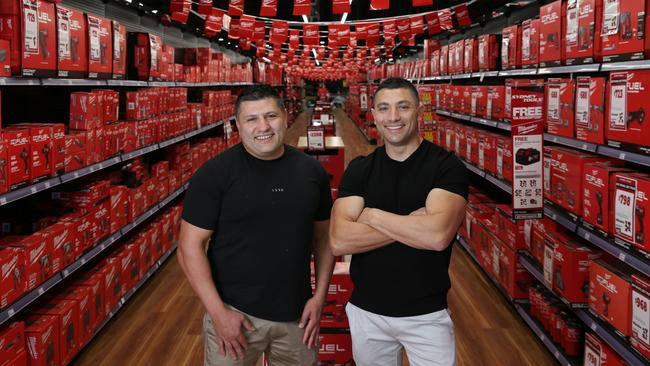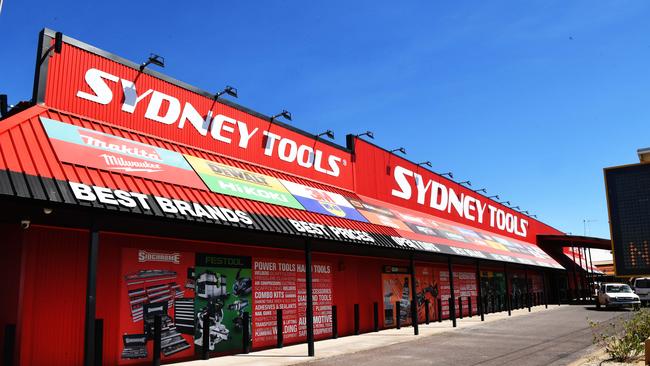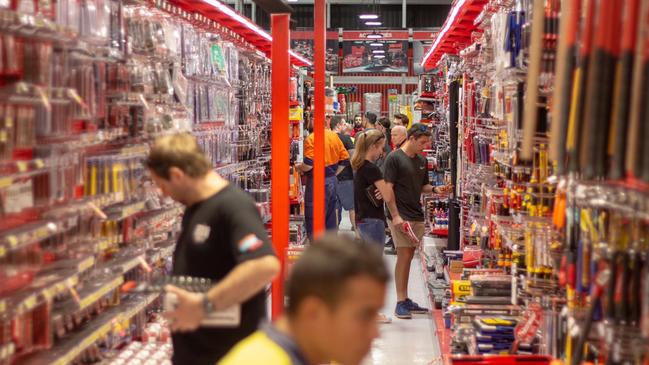The tough times for tradies could last up to four years, says Sydney Tools boss
The Bey brothers run a $700m business that is a consumer barometer and it shows tradies are hurting and the economic outlook is uncertain.

May and June are the best time for sales for Bey brothers Elvis and Jason, but this year the Sydney Tools co-owners are seeing economic headwinds they say will not ease for a long time.
Tradies who are the main source of the circa $700m annual revenue for Sydney Tools, are hurting.
The construction sector is rocking from a series of home builder collapses and this week’s federal budget included a considerable tightening of the popular instant asset write-off scheme, which was another blow.
Add to that inflation and subsequent cost-of-living pressures, says Jason Bey, and it is clear tradies – a barometer of economic activity given the spending they do for their businesses – are doing it tough.
“Australia is a tradie country. It is blue collar, particularly when you get outside the (CBD) here in Sydney and Melbourne, parts of Queensland even more,” Mr Bey tells The Weekend Australia.
“We’re at the coal face as a national retailer and we get to see and feel the market quicker than most. And I think what you see get reported is often a couple of months behind.
“We’ve got our finger on the pulse and we live inside that economy. And I can tell you that the market is very sluggish.”
For Sydney Tools that means revenue is likely to be roughly in line with last year, when it made a net profit of almost $60m from $716m revenue, according to documents lodged with the corporate regulator.

But profits could flatline given the impact inflation is having on the company’s own cost base, with wages rising, and rents for warehouses and outlets also on the rise.
If tradies have less to spend at Sydney Tools on drills, ladders, welding equipment and other tools then there could be an issue.
Mr Bey says it is hard to put prices up too much, so he has to find other savings and efficiencies in the business.
All of this comes as Mr Bey forecasts that the general economy and consumer spending will take years to recover – which he says is the clear intention of the Reserve Bank and its almost year-old series of interest rate rises.
“In 2020 there was Covid and people were panicking, and then everyone was worrying about 2021, so the government came out with stimulus measures and propelled the economy to heights we hadn’t seen before,” Mr Bey says.
“Then everyone was worried about 2022 that the market was too buoyant and in the back of people’s minds they were worried about the challenges ahead when the stimulus went and thought we’d have a crash in 2023.
“Well we’re here now and while I don’t think there will be a car accident, there are certainly signs that there’s a dip in consumer confidence. And that’s a trend that is going to continue.”
Mr Bey points to the RBA’s current cash rate of 3.85 per cent and predicts that it could rise to 5 per cent as it has in the US or the 5.25 per cent rate now in New Zealand given that inflation isn’t yet being tamed.
“But even when (the rates) get there it isn’t going to suddenly go down, is it,” he says.
“It is likely to be parked there for quite some time. So I think that means it will be three to four years until the economy picks up again.”
Mr Bey says it is clear from talking to tradie customers that larger property and infrastructure developments will continue, but the increase in costs means “you’ll find that the smaller to medium-sized builders are going to struggle”.
He says those in industries with government contracts, a part of the market that is lucrative relative to the private construction sector, should continue to operate reasonably well. The build-to-rent apartment market should also hold up as demands for dwellings increase. But profits for tradies are increasingly harder to come by.
So Mr Bey will watch sales at Sydney Tools in the next six to seven weeks – the period leading up to June 30 – with even more interest than usual.
Tradies usually take much of January off and therefore sales are slow as the calendar year starts to unfold, Mr Bey says, then pick before a lull around Anzac Day.
A big percentage of revenue then comes in as tradies buy up before the end of the financial year in order to get the tax write-offs.
Budget changes to the instant asset write-off scheme will have an effect, when the amount businesses can claim for new equipment falls to $20,000 and is restricted to firms with turnover of less than $10m.

Commentary has suggested there will be a rush to buy utes before the measures are changed on June 30, and Mr Bey wonders how much will be left over in their pockets for tradies to spend on tools before then.
After that, tools could be more attractive, though Mr Bey is concerned an economic slowdown will cut their spending anyway.
“All of this I think is going to have a significant effect, inflation and rising interest rates in particular. It will have an impact on what tradies are spending on their tools,” he says.
Yet Mr Bey is also determined to take advantage of a downturn for his own business. With more than $100m in net profit over the past two financial years – enough for he and his brother to place on The List – Australia’s Richest 250 this year – and little in the way of debt, Mr Bey wants Sydney Tools to forge ahead with expansion plans.
“There are headwinds coming up, but we’re trying to stay ahead of the game. We’ve got about 80 stores now and are planning to roll out another 10 by the end of the year,” Mr Bey explains.
He does admit that he has to be judicious about the growth though, with staff costs increasing. Mr Bey also says some landlords are asking for big rent rises. One positive for the business is the big drop in the cost of shipping containers – now about $500 each rather than $10,000 at the height of the Covid-19 freight snarl in late 2021 – but local trucking costs are increasing rapidly too.
“Our costs are increasing and I’m not sure that ever goes backwards again,” Mr Bey says. “We invest a lot in our training and you never want to lose staff because we’re not paying them enough.
“But there are still opportunities out there and I feel there are markets that are not serviced that we can be in. But he have to more cautious and grow in a measured way because there definitely is some concern about the economic climate.”




To join the conversation, please log in. Don't have an account? Register
Join the conversation, you are commenting as Logout